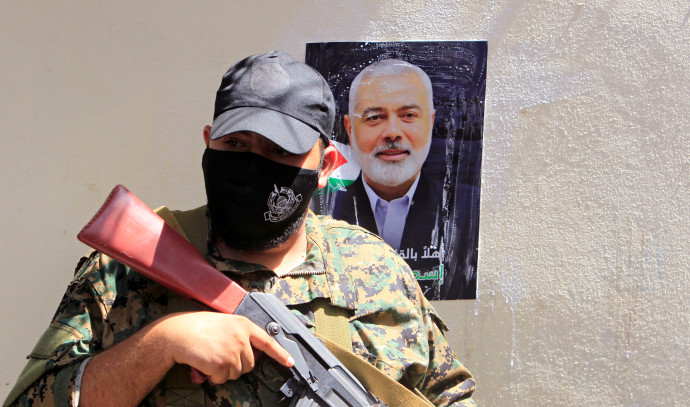Hamas leader Ismail Haniyeh is expected to visit Egypt on Wednesday to hold Gaza ceasefire talks, the AFP reported Tuesday, as Prime Minister Benjamin Netanyahu insisted that any hostage deal must include all the remaining hostages in Gaza.
“Just now, I twice sent the Director of the Mossad to Europe to advance a process for the release of our hostages. I will spare no effort on the matter, and the demand is to bring them all,” Netanyahu said in a meeting he held with his wife Sara and family members of the hostages in Tel Aviv on Tuesday night.
"We are committed, and I am personally committed, to the release of all of the hostages. Rescuing them is the highest mission,” Netanyahu said.
Coordinator for the Hostages and Missing Brig.-Gen. (Res.) Gal Hirsch, National Security Council Director Tzachi Hanegbi, and the Prime Minister's Military Secretary, Maj.-Gen. Avi Gil also attended the meeting.
Herzog: Israel is ready for another humanitarian pause
At a meeting of ambassadors posted to Israel, President Isaac Herzog signaled readiness for another pause to the Gaza war.
"Israel is ready for another humanitarian pause and additional humanitarian aid in order to enable the release of hostages,” Herzog said.
"And the responsibility lies fully with [Hamas leader Yahya] Sinwar and Hamas leadership," he stressed.
Israel and the United States have noted that the war could end at any moment if Hamas would release its hostages and surrender to Israel.
In an initial hostage deal mediated by Qatar and Egypt, the Gaza war was put on hold for seven days in November. 105 captives were freed during this time, but the deal fell apart before its conclusion. Israel and the United States have blamed Hamas for violating that deal.
A meeting of Qatari Prime Minister Mohammed bin Abdulrahman Al Thani, Mossad Director David Barnea, and CIA Director Bill Burns on Monday on steps for a second deal to free further hostages was positive, but no deal is imminent, a source briefed on the diplomatic efforts said.
The three met in Warsaw to discuss a potential new deal to secure the release of Israeli hostages held in Gaza in exchange for a potential humanitarian pause to the war and the release of Palestinians jailed in Israel on security-related charges, including terrorism and killing Israelis. They held a similar meeting in Europe last week.
“The talks were positive with negotiators exploring and discussing different proposals in an attempt to progress on negotiations,” a source told Reuters. “An agreement is not expected imminently, however.”
Qatar and Egypt, which are attempting to mediate a second hostage deal, have not been able to bridge some of the differences between the two sides, including a Hamas demand for a permanent ceasefire.
Netanyahu has explained that any pause to the war must be temporary and that the deal must include all the hostages. It’s presumed that there are more than 120 remaining out of some 250 that Hamas seized during its October 7 infiltration into southern Israel. Hamas also killed over 1,200 people during that attack.
US National Security Council spokesman John Kirby said, “We don’t support a permanent ceasefire at this time. It would simply validate what Hamas did on the 7th of October. It would leave them in power in Gaza, which is unacceptable to us and to our Israeli friends, and of course, it would give them a much longer timeline to prepare and plan additional attacks,” Kirby said.
“We do support smaller, more localized, more targeted humanitarian pauses to get hostages out and to get more aid in,” Kirby said.
ICRC deplores the conflict in Gaza as a 'moral failure'
The head of the International Committee of the Red Cross (ICRC) on Tuesday deplored the conflict in Gaza as a "moral failure" of the international community and urged Israel and Hamas to reach a new deal to halt the fighting.
She spoke as Hamas has asserted that the death toll from Palestinians in Gaza war violence is close to 20,000. Israel has asserted that over 7,000 of those fatalities are combatants.
“I have been speaking of moral failure because every day this continues is a day more where the international community hasn’t proven capable of ending such high levels of suffering and this will have an impact on generations not only in Gaza,” ICRC president Mirjana Spoljaric told journalists in Geneva following trips to the Gaza Strip and Israel.
“There’s nothing without an agreement by the two sides, so we urge them to keep negotiating...” she said, referring to the release of Israeli hostages.
Although the ICRC facilitated the release of hostages during the truce, the group has been criticized by some Israelis for not doing more to free others and provide them with medical care. Some social media users have equated it to a taxi service to drive hostages out of Gaza.
“You don’t just go there and take the hostages and bring them out,” Spoljaric said, saying that any analogy with an Uber or taxi service was “unacceptable and outrageous.”
“We continue to talk to all sides to then be ready to operationalize the agreement that they reach,” Spoljaric said.
“What is clear is that at the current level of hostilities, a meaningful humanitarian response remains extremely difficult, if not impossible,” she said.
Reuters contributed to this report.

